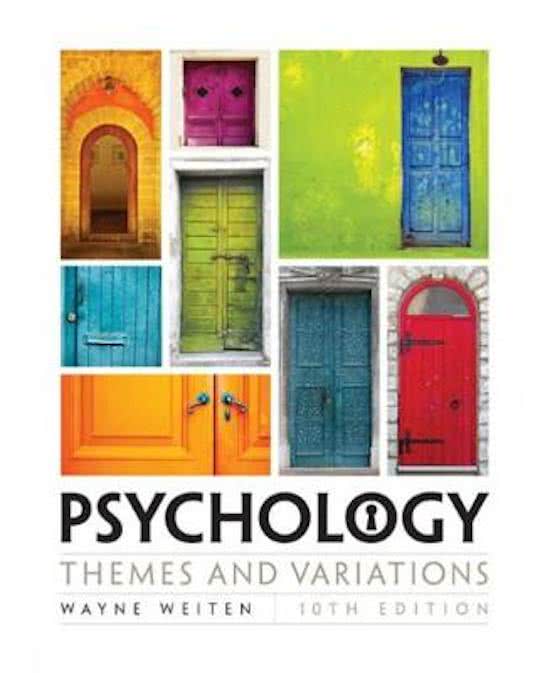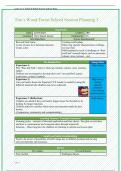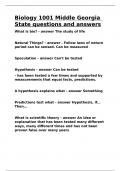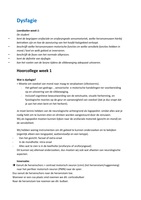Chapter 12: Personality
Important personality theory debates (Not in textbook)
We formulate opinions about the personality of others, which we use to either include
or exclude from our lives, or particular social processes and practices.
Language of personality is in everyday lives- personality is fundamentally trenched in
the way that we live, based on the language we use to describe other people. When we
use phrase/adjectives to describe people we are participating in practice of psychology
language.
Defining personality:
1. Personality is a person's attributes and qualities that make them unique.
This definition draws attention to individuals. Individualistic.
2. Personality refers to the unique style of interacting with others and of reacting to the
environment.
Draws attention to our social aspect. It emphasises the environment, context,
location in which individual is situated.
Important debates in personality Theory
1. Free wil versus Determinism
Is personality the result of choices people make? (Free will) OR is it shaped by
forces beyond people's control? (Determinism)
Humanistic theories emphasise free will because they argue that people make
conscious and forward thinking decisions to achieve their highest potential.
Psychodynamic theories (deterministic) emphasize the unconscious which is said
to undermine the conscious mind.
2. Nature versus Nurture
Is personality something people are born with OR is it shaped by the
environment?
Biological personality theories- argue that personality is inherited based on
genetic make up.
Behavioural personality theories emphasise nurture because they argue that
personality is learned.
3. Past versus Present
Is personality shaped by people's past or present?
Psychodynamic theories emphasise the past because they argue that childhood
experiences shape personality in adulthood.
, Humanistic theories emphasise the present because they argue that personality is
motivated by present circumstances which motivate people to move forward and
upward in life.
4. Uniqueness versus Universality
I personality unique in relation to others or is it similar across people?
Cognitive behavioural theories emphasize uniqueness because they argue that
personality is influenced by people's unique thinking processes and patterns.
Biological personality perspective trait theories emphasize universality because
they argue that there are core personality traits that all people are born with.
5. Consistency versus Malleability
Is personality permanent or ever- changing and evolving?
Behavioural theories emphasize consistency because they argue that personality is
a matter of learned responses to either behaviour that is rewarded or punished.
Humanistic theories emphasize malleability because they argue that personality is
based on people's ever-changing needs in response to always moving forward.
12.1 The Nature of Personality
Personality is a complex hypothetical construct that has been defined in a variety of
ways.
12.1.1 Defining personality: Consistency and Distinctiveness
Optimistic personality- person has fairly consistent tendency to behave in a cheerful,
hopeful, and enthusiastic way. Although no one is entirely consistent in behaviour, this
quality of consistency across situation lies at the core of concept of personality.
Distinctiveness is also central to concept of personality.
Personality used to explain why people don't act the same way in similar situations.
Each person has traits that are seen in otehr people, but each has his/her own
distinctive set of personality traits that make up who they are.
Concept of personality used to explain:
a) stability in a person's behaviour over time and across situations (consistency)
b) the behavioural differences among people reacting to the same situation
(distinctiveness)
Personality refers to an individual's unique set of consistent behavioural traits.
12.21 Personality traits: Dispositions and Dimensions
A personality trait is a durable disposition to behave in a particular way in a
variety of situations. Adjectives such as honesty, dependable, moody, impulsive,
suspicious, anxious, excitable, domineering and friendly describe dispositions that
represent personality traits.
, A number of psychologists have taken on the challenge of identifying the basic traits
that form the core of personality. Raymond Cattell used the statistical procedure of
factor analysis to reduce a list of 171 personality traits compiled by Gordon Allport to
just 16 basic dimensions of personality.
In Factor Analysis, correlations among many variables are analysed to identify closely
related clusters of variables. If the measurements of a number of variables correlate
highly with one another, the assumption is that a single factor is influencing all of
them. Factor analysis is used to identify hidden factors.
Based on his factor analytic work, Cattell concluded that an individual's personality
can be described completely by measuring just 16 dimensions.
12.1.3 The five-factor Model of personality traits
Robert McCrae and Paul Costa used 5-factor model- most personality traits are derived
from just five higher-order traits that have come yo be known as big five.
1. EXTRAVERSION: Characterised as outgoing, sociable, upbeat, friendly, assertive
and gregarious. Referred to as positive emotionality in some trait models. They
have more positive outlook on life and are motivated to pursue social contact,
intimacy and interdependence.
2. NEUROTICISM: Tend to be anxious, hostile, self-conscious, insecure and
vulnerable. Tend to overreact more than others in response to stress. Also tend to
exhibit more impulsiveness and emotional instability than others.
3. OPENNESS TO EXPERIENCE: Openness is associated with curiosity, flexibility,
vivid fantasy, imaginativeness, artistic sensitivity and unconventional attitudes.
Tend to tolerate ambiguity and have less need for closure on issues.
4. AGREEABLENESS: tend to be sympathetic , trusting, cooperative, modest and
straightforwards. Agreeableness is associated with constructive approaches to
conflict resolution, making them less quarrelsome than others. Correlated with
empathy and helping behaviour.
5. CONSCIENTIOUSNESS: Tend to be disciplined, well-organised, punctual and
dependable. Associated with strong self-discipline.
Important personality theory debates (Not in textbook)
We formulate opinions about the personality of others, which we use to either include
or exclude from our lives, or particular social processes and practices.
Language of personality is in everyday lives- personality is fundamentally trenched in
the way that we live, based on the language we use to describe other people. When we
use phrase/adjectives to describe people we are participating in practice of psychology
language.
Defining personality:
1. Personality is a person's attributes and qualities that make them unique.
This definition draws attention to individuals. Individualistic.
2. Personality refers to the unique style of interacting with others and of reacting to the
environment.
Draws attention to our social aspect. It emphasises the environment, context,
location in which individual is situated.
Important debates in personality Theory
1. Free wil versus Determinism
Is personality the result of choices people make? (Free will) OR is it shaped by
forces beyond people's control? (Determinism)
Humanistic theories emphasise free will because they argue that people make
conscious and forward thinking decisions to achieve their highest potential.
Psychodynamic theories (deterministic) emphasize the unconscious which is said
to undermine the conscious mind.
2. Nature versus Nurture
Is personality something people are born with OR is it shaped by the
environment?
Biological personality theories- argue that personality is inherited based on
genetic make up.
Behavioural personality theories emphasise nurture because they argue that
personality is learned.
3. Past versus Present
Is personality shaped by people's past or present?
Psychodynamic theories emphasise the past because they argue that childhood
experiences shape personality in adulthood.
, Humanistic theories emphasise the present because they argue that personality is
motivated by present circumstances which motivate people to move forward and
upward in life.
4. Uniqueness versus Universality
I personality unique in relation to others or is it similar across people?
Cognitive behavioural theories emphasize uniqueness because they argue that
personality is influenced by people's unique thinking processes and patterns.
Biological personality perspective trait theories emphasize universality because
they argue that there are core personality traits that all people are born with.
5. Consistency versus Malleability
Is personality permanent or ever- changing and evolving?
Behavioural theories emphasize consistency because they argue that personality is
a matter of learned responses to either behaviour that is rewarded or punished.
Humanistic theories emphasize malleability because they argue that personality is
based on people's ever-changing needs in response to always moving forward.
12.1 The Nature of Personality
Personality is a complex hypothetical construct that has been defined in a variety of
ways.
12.1.1 Defining personality: Consistency and Distinctiveness
Optimistic personality- person has fairly consistent tendency to behave in a cheerful,
hopeful, and enthusiastic way. Although no one is entirely consistent in behaviour, this
quality of consistency across situation lies at the core of concept of personality.
Distinctiveness is also central to concept of personality.
Personality used to explain why people don't act the same way in similar situations.
Each person has traits that are seen in otehr people, but each has his/her own
distinctive set of personality traits that make up who they are.
Concept of personality used to explain:
a) stability in a person's behaviour over time and across situations (consistency)
b) the behavioural differences among people reacting to the same situation
(distinctiveness)
Personality refers to an individual's unique set of consistent behavioural traits.
12.21 Personality traits: Dispositions and Dimensions
A personality trait is a durable disposition to behave in a particular way in a
variety of situations. Adjectives such as honesty, dependable, moody, impulsive,
suspicious, anxious, excitable, domineering and friendly describe dispositions that
represent personality traits.
, A number of psychologists have taken on the challenge of identifying the basic traits
that form the core of personality. Raymond Cattell used the statistical procedure of
factor analysis to reduce a list of 171 personality traits compiled by Gordon Allport to
just 16 basic dimensions of personality.
In Factor Analysis, correlations among many variables are analysed to identify closely
related clusters of variables. If the measurements of a number of variables correlate
highly with one another, the assumption is that a single factor is influencing all of
them. Factor analysis is used to identify hidden factors.
Based on his factor analytic work, Cattell concluded that an individual's personality
can be described completely by measuring just 16 dimensions.
12.1.3 The five-factor Model of personality traits
Robert McCrae and Paul Costa used 5-factor model- most personality traits are derived
from just five higher-order traits that have come yo be known as big five.
1. EXTRAVERSION: Characterised as outgoing, sociable, upbeat, friendly, assertive
and gregarious. Referred to as positive emotionality in some trait models. They
have more positive outlook on life and are motivated to pursue social contact,
intimacy and interdependence.
2. NEUROTICISM: Tend to be anxious, hostile, self-conscious, insecure and
vulnerable. Tend to overreact more than others in response to stress. Also tend to
exhibit more impulsiveness and emotional instability than others.
3. OPENNESS TO EXPERIENCE: Openness is associated with curiosity, flexibility,
vivid fantasy, imaginativeness, artistic sensitivity and unconventional attitudes.
Tend to tolerate ambiguity and have less need for closure on issues.
4. AGREEABLENESS: tend to be sympathetic , trusting, cooperative, modest and
straightforwards. Agreeableness is associated with constructive approaches to
conflict resolution, making them less quarrelsome than others. Correlated with
empathy and helping behaviour.
5. CONSCIENTIOUSNESS: Tend to be disciplined, well-organised, punctual and
dependable. Associated with strong self-discipline.





